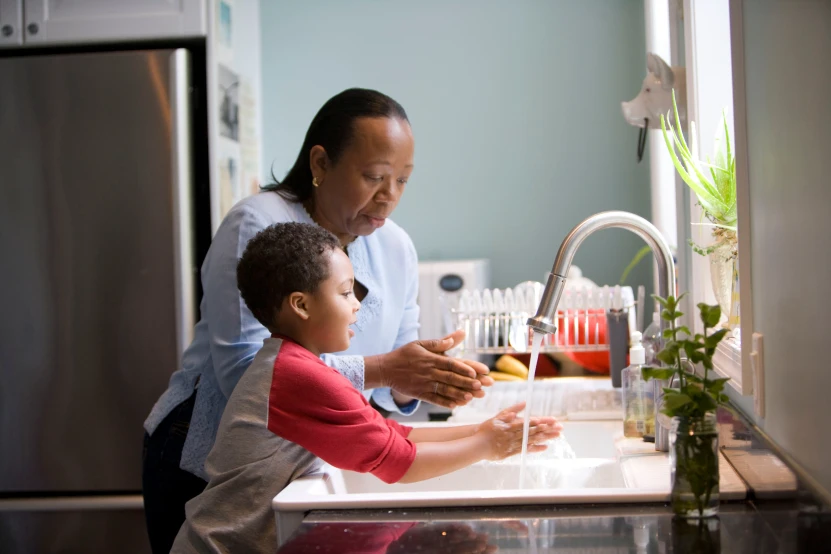How to prevent water damage in your home
Posted September 22nd, 2025 by SimpliSafe

How can water damage your home?
Although water damage can be a result of natural disasters in extreme cases - such as floods - these aren’t the only ways your home’s structure can come under attack. Water damage primarily occurs as a result of one ‘minor’ issue that can develop into something more serious when left unchecked - such as a small leak in a pipe, a blocked gutter or a faulty sump pump. These scenarios can lead to devastating consequences, as the water slowly rots and weakens your home’s structural elements, creating black mould, which can also affect the immune system and cause respiratory problems. So, to avoid the potential risk to your health, alongside preventing a hefty financial cost, this blog post will give you some tips on how you can prevent water damage in your home.
Install a water sensor
One of the best ways to prevent water damage is to install a Water Sensor, which will detect leaks and floods for you. It’s helpful to position these close to common household water sources, such as a dishwasher, washing machine or water heater. However, be mindful of the placement so there are no false alarms such as dripping water from the sink after washing the dishes.
Those on our professional monitoring plan will be notified in an emergency by our professional monitoring centre, you will receive a call from them and they will alert you of the incident.
Check for leaks
Check for leaks regularly, looking around sinks, showers and baths, dishwashers or washing machines for any signs of water damage. When left undetected, even a minor leak could cause some serious problems, so being proactive with your checks will protect your home and your finances.
Ensure your sump pump works
A sump pump - which is commonly located in the basement - is a pump that detects elevating water levels and water pressure, ensuring that this doesn’t get to a dangerous level. By keeping this maintained and serviced annually, you’ll reduce the risk of flooding.
Clean out your gutters
Keeping your gutters clean is yet another way to effectively prevent water damage in your home, as blocked gutters are a major cause of dampness. Moss, weeds and leaves can all cause a blockage if you’re not careful, so check whether your gutters are sagging to determine if they need a clean out.
Install a temperature sensor to stop pipes freezing
Equip your home with a Temperature Sensor to prevent your pipes from bursting - an issue that’s rather costly to fix. If your home drops below 5°C, you’ll be alerted immediately - meaning that you can tend to the issue before it escalates.
Insulate exposed pipes
Any exposed pipes should be insulated to prevent your home from becoming water damaged through freezing. Plus, heat transfer will be limited, which will improve your home’s thermal efficiency. Use snap-on pipe insulation for a cheap yet efficient solution.
Check for signs of damp
Always keep an eye out for signs of dampness, such as a rotten smell, flare-ups of asthma or allergies, flaking wallpaper, black marks on sills and skirting boards, or walls that are cold to the touch, which could indicate that additional insulation is needed. You could also check windows and skylights for condensation in the morning, which could suggest that your home has a higher than average moisture level.
Grade exterior soil
The ground adjacent to your home should incline once it reaches the foundation wall. If the ground declines, you could risk a pool of water forming, which can lead to serious water damage. Re-grading the soil is the easiest solution. By packing the soil down and ramping the ground away from the foundation wall, water will be able to travel down safely, without soaking into the soil.
Check your roof
See whether there’s any sign of a water leak by checking the inside of your attic - looking out for damp spots or any tea-coloured plaster stains on the ceiling. Don’t forget to check the outside of your roof too, again looking for any structural damage. Make sure the flashing that surrounds your chimney - if you have one - is intact for further reassurance.
Monitor water pressure
Check your water bill history to see whether there have been any unusual spikes in usage - which could indicate that there’s been a leak. This simple task could help you to identify a problem before it becomes a more serious issue.
Looking for some more advice on how to optimise your home’s safety and security? Contact our team today to discover how the SimpliSafe security system could help you. Being a bespoke system that can be built based on your needs, you’ll have the option to explore through a variety of additional accessories - from Water Sensors to Temperature Sensors - to protect home from harm.